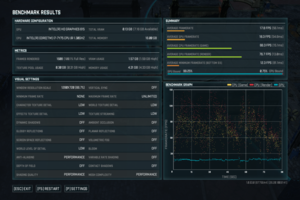Intel UHD Graphics 617 vs Intel HD Graphics 615
Intel UHD Graphics 617
► remove from comparison
The Intel UHD Graphics 617 (GT2) is a low-end integrated graphics unit, which can be found in the Y-series of the Amber-Lake generation. This "GT2" version offers 24 Execution Units (EUs) clocked at up to 1050 MHz (depending on the CPU model). Due to its lack of dedicated graphics memory or eDRAM cache, the UHD 617 has to access the main memory (2x 64bit DDR3L/LPDDR3). Compared to the old HD Graphics 615 in Kaby-Lake-Y CPUs, the UHD 617 is the same GPU with slightly different clock speeds (depending on the model) and slight power/performance improvements due to the improved 14nm++ process. Compared to the similar UHD Graphics 615 in other Amber Lake models, the 617 looks to be higher clocked (+50 MHz) and has more headroom due to the higher TDP of 7 versus 5 Watt.
Performance
The 3D performance of the UHD 617 depends on the CPU model and the cooling / TDP-setting of the laptop. Furthermore, the used main memory (single channel, DDR3(L), amount) is influencing performance. On average the UHD graphics 617 should be very similar to the Kaby-Lake HD Graphics 615 due to the same architecture and similar speeds. That means that only low demanding games like Farming Simulator 17 or Rocket League are playable in lowest detail settings.
Features
The revised video engine in the HD 615 and UHD 615 / 617 now supports H.265/HEVC Main10 profile in hardware with 10 bit colors. Furthermore, Googles VP9 codec can also be hardware decoded. The UHD 617 should support HDCP 2.2 and therefore Netflix 4K. HDMI 2.0 however is still only supported with an external converter chip (LSPCon).
Power Consumption
The UHD Graphics 617 can be found in Y processors with 7 W TDP and is therefore suited for very thin, mostly passively cooled subnotebooks like the MacBook Air 2018.
Intel HD Graphics 615
► remove from comparison
The Intel HD Graphics 615 (GT2) is a low-end integrated graphics unit, which can be found in the Y-series of the Kaby Lake generation. This "GT2" version offers 24 Execution Units (EUs) clocked at up to 1050 MHz (depending on the CPU model). Due to its lack of dedicated graphics memory or eDRAM cache, the HD 615 has to access the main memory (2x 64bit DDR3L/LPDDR3).
Performance
The 3D performance of the HD 615 depends on the CPU model and the cooling / TDP-setting of the laptop. Furthermore, the used main memory (single channel, DDR3(L), amount) is influencing performance. On average the HD graphics 615 should be around 20 to 30 percent faster than the previous generation, the HD Graphics 615. Therefore, it may even reach the performance of the HD Graphics 520. Some low demanding games should therefore be playable with the chip.
Features
The revised video engine now supports H.265/HEVC Main10 profile in hardware with 10 bit colors. Furthermore, Googles VP9 codec can also be hardware decoded. The first models do not support HDCP 2.2 and therefore Netflix 4K. This was added with the new models in 2017 and beginning of May 2017 also the older CPU models like the m3-7Y30 are now shipped with a new S-Spec Code that supports HDCP 2.2. HDMI 2.0 however is still only supported with an external converter chip (LSPCon).
Power Consumption
The HD Graphics 615 can be found in Y processors with 4.5 W TDP (can be manipulated by the laptop manufacturers) and is therefore suited for very thin, mostly passively cooled 2-in-1 notebooks and tablets.
| Intel UHD Graphics 617 | Intel HD Graphics 615 | |||||||||||||||||||||||||||||||||||||||||||||||||||||||||||||||||||||||||||||||
| Gen. 9.5 Series |
|
| ||||||||||||||||||||||||||||||||||||||||||||||||||||||||||||||||||||||||||||||
| Codename | Kaby-Lake GT2 | Kaby-Lake GT2 | ||||||||||||||||||||||||||||||||||||||||||||||||||||||||||||||||||||||||||||||
| Architecture | Gen. 9 Amber Lake | Gen. 9 Kaby Lake | ||||||||||||||||||||||||||||||||||||||||||||||||||||||||||||||||||||||||||||||
| Pipelines | 24 - unified | 24 - unified | ||||||||||||||||||||||||||||||||||||||||||||||||||||||||||||||||||||||||||||||
| Core Speed | 300 - 1150 (Boost) MHz | 300 - 1050 (Boost) MHz | ||||||||||||||||||||||||||||||||||||||||||||||||||||||||||||||||||||||||||||||
| Memory Bus Width | 64/128 Bit | 64/128 Bit | ||||||||||||||||||||||||||||||||||||||||||||||||||||||||||||||||||||||||||||||
| Memory Type | DDR3L/LPDDR3 | DDR3L/LPDDR3 | ||||||||||||||||||||||||||||||||||||||||||||||||||||||||||||||||||||||||||||||
| Shared Memory | yes | yes | ||||||||||||||||||||||||||||||||||||||||||||||||||||||||||||||||||||||||||||||
| API | DirectX 12_1, OpenGL 4.4 | DirectX 12_1, OpenGL 4.4 | ||||||||||||||||||||||||||||||||||||||||||||||||||||||||||||||||||||||||||||||
| technology | 14 nm | 14 nm | ||||||||||||||||||||||||||||||||||||||||||||||||||||||||||||||||||||||||||||||
| Features | QuickSync | QuickSync | ||||||||||||||||||||||||||||||||||||||||||||||||||||||||||||||||||||||||||||||
| Date of Announcement | 30.10.2018 | 30.08.2016 |
|
| ||||||||||||||||||||||||||||||||||||||||
Benchmarks
3DM Vant. Perf. total + Intel HD Graphics 615
Cinebench R15 OpenGL 64 Bit + Intel UHD Graphics 617
GFXBench T-Rex HD Offscreen C24Z16 + Intel HD Graphics 615
Average Benchmarks Intel UHD Graphics 617 → 100% n=14
Average Benchmarks Intel HD Graphics 615 → 85% n=14
* Smaller numbers mean a higher performance
1 This benchmark is not used for the average calculation
Game Benchmarks
The following benchmarks stem from our benchmarks of review laptops. The performance depends on the used graphics memory, clock rate, processor, system settings, drivers, and operating systems. So the results don't have to be representative for all laptops with this GPU. For detailed information on the benchmark results, click on the fps number.

Gears Tactics
2020
Hearthstone
2020
League of Legends
2019
The Crew 2
2018
X-Plane 11.11
2018
Call of Duty WWII
2017
The Evil Within 2
2017
Rocket League
2017
Resident Evil 7
2017
Titanfall 2
2016
Farming Simulator 17
2016
Battlefield 1
2016
Civilization 6
2016
The Division
2016
Far Cry Primal
2016
Rainbow Six Siege
2015
World of Warships
2015
Metal Gear Solid V
2015
Dota 2 Reborn
2015
The Witcher 3
2015
Dirt Rally
2015
GTA V
2015
Battlefield Hardline
2015
Alien: Isolation
2014
Sims 4
2014
GRID: Autosport
2014
Battlefield 4
2013
Metro: Last Light
2013
BioShock Infinite
2013
Tomb Raider
2013
Hitman: Absolution
2012
Counter-Strike: GO
2012
Diablo III
2012Average Gaming Intel UHD Graphics 617 → 100%
Average Gaming 30-70 fps → 100%
Average Gaming Intel HD Graphics 615 → 88%
Average Gaming 30-70 fps → 87%
For more games that might be playable and a list of all games and graphics cards visit our Gaming List























































